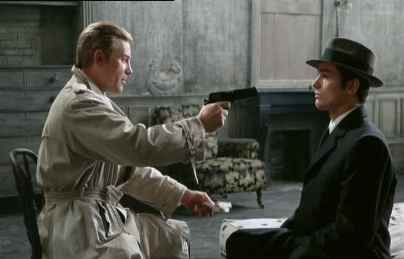A part of this viewing list: Criterion Collection Spine #306: Jean-Pierre Melville’s Le Samouraï.

In a film like Le Samouraï, “never” means “always”. When the police inspector says that he never thinks, we know he is always thinking and when hit man Jef Costello [Alain Delon] says he never loses we know he’s already lost everything. This film is a study in cool; the smooth control that so many of us strive for, and which often transfers awkwardly on film, comes across here as natural and essential. Melville referred to Costello as a schizophrenic, but to me he appears more sociopathic than anything else. I think the reason his cloak of cool is so authentic is because of this neurosis. Melville also said he was trying to make a black and white film using color stock and the greyscale of much of the film enhances the coiled equilibrium of Delon’s character.
Dialogue is as sparse as color, and when color becomes vibrantly present we feel that Costello is in a place he should not be. This is assisted by the fact that he looks like a three day dead corpse in the best of light. That adds to the grave coolness. Despite his meticulous patterns, he is a sloppy killer. There are 5 witnesses to his murder, and although is alibi is airtight, he eventually faces the music we all know is playing for him.

What is really interesting is the way you can feel the hand of the director, showing, not hinting, but ultimately as objective and heartless as the assassin. But where it is possible to sense tightly reined emotions in Costello, Melville seems bereft of them all. The film is defined by what it lacks, it is almost a documentary, it makes no excuses for what it can and cannot show, and leaves it to us to draw our own conclusions.